Falcon9
Latest
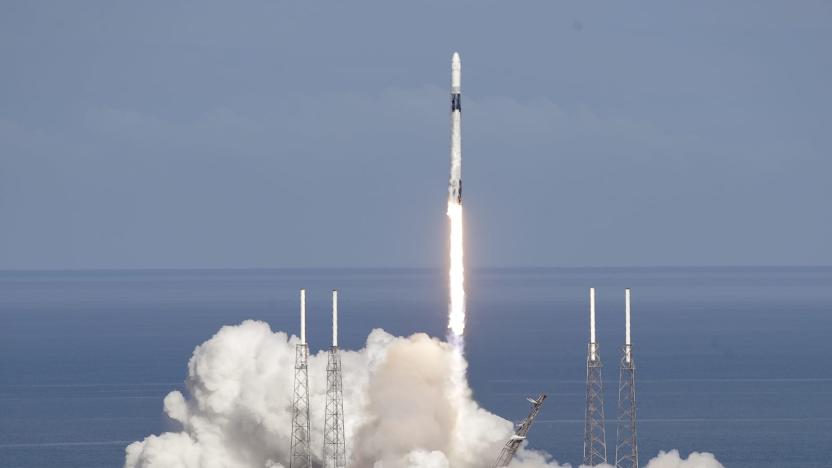
SpaceX 'rideshare' program launches satellites for just $2.5 million
For space tech startups and other small companies doing research, one of the biggest hurdles is actually getting to space. SpaceX is looking to change that. Today, it announced a SmallSat Rideshare Program, which will allow small satellite operators to book a spot on regularly scheduled Falcon 9 launches.
Christine Fisher08.05.2019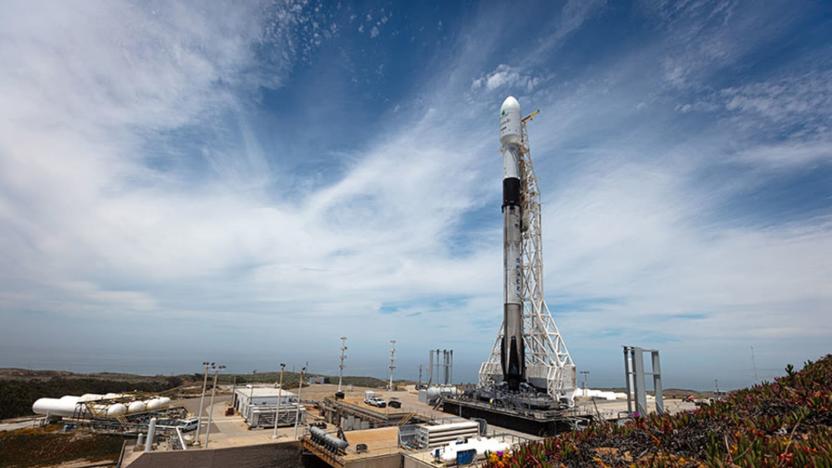
Watch SpaceX launch Earth observation satellites at 10:17AM ET
SpaceX is about to get your morning started in dramatic fashion (if you're in the Americas, that is). The private spaceflight outfit plans to launch Canada's RADARSAT Constellation Mission as soon as 10:17AM Eastern, with the satellites deploying in earnest 54 minutes after blastoff. The company is using the same Falcon 9 first stage that put the Crew Dragon demonstration mission into orbit back in March, and it expects to land the rocket at Vandenberg Air Force Base.
Jon Fingas06.12.2019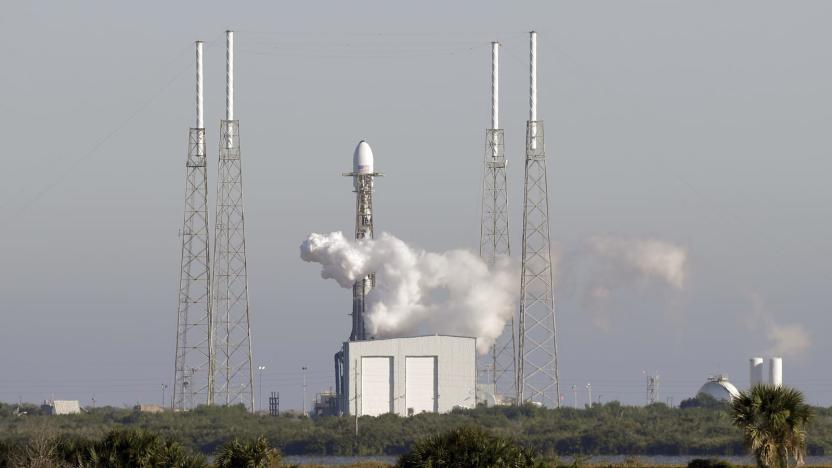
SpaceX completes its first US national security mission
SpaceX managed to squeak in one more milestone before the end of 2018. The private spaceflight company successfully launched its first-ever US national security mission, carrying the US Air Force's equally new GPS III satellite into orbit. The effort was comparatively messy as far as recent SpaceX launches go. The company delayed the launch multiple times over the past several days, and the Air Force's performance margin requirements ruled out a landing for the Falcon 9 rocket's first stage.
Jon Fingas12.23.2018
The Air Force's long-awaited GPS upgrade begins tomorrow (update)
It's been in the works for over a decade, but now the current Global Positioning System (GPS) is about to start getting its multibillion-dollar upgrade thanks to SpaceX's first-ever GPS satellite launch. After delays across the last four years, a SpaceX Falcon 9 rocket was scheduled to launch the United States Air Force's first Global Positioning System III space vehicle from from Cape Canaveral between 9:11AM ET and 9:37AM ET this morning (December 18th, 2018). However, the launch has been pushed to tomorrow morning at 9:07AM ET "due to an out of family reading on first stage sensors."
Rachel England12.18.2018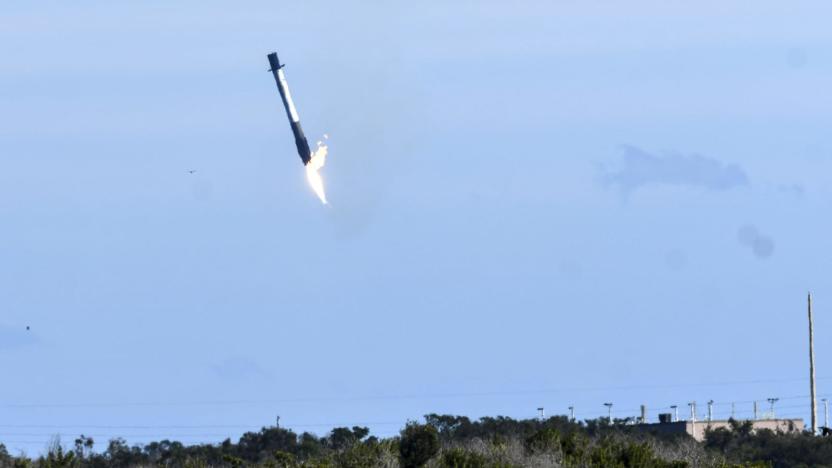
Falcon 9 misses landing after latest SpaceX mission to the ISS (update)
SpaceX has made sure it's got its money's worth out of the Falcon 9. On Wednesday, the rocket successfully launched for a resupply mission to the International Space Station. Unfortunately, though, the milestone was marred by a missed landing of the booster's first stage.
Rachel England12.06.2018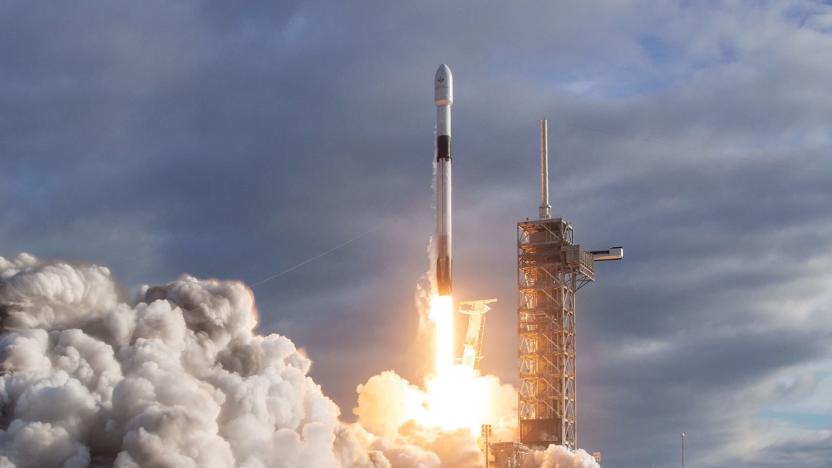
Watch SpaceX launch a twice-used rocket (update: postponed)
SpaceX is no stranger to reusing rockets at this point, but no Falcon 9 has flown more than twice... well, until now. The private spaceflight firm is launching the Spaceflight SSO-A: SmallSat Express mission on December 2nd at 1:31PM Eastern with a rocket that has already completed two launches (and, of course, returns) in 2018. This time, though, it's launching from Vandenberg Air Force Base in California instead of from the East coast, like it did in May and August.
Jon Fingas12.01.2018
SpaceX drops plans to make Falcon 9 rockets more reusable
For a while, SpaceX has dreamed of making its Falcon 9 rocket as reusable as possible, and not just the first stage. Now, though, it's having a change of heart. SpaceX has scrapped plans to make the rocket's second stage reusable. Instead, Elon Musk said, it's focused on "accelerating" development of the BFR. Musk also teased a significant design shake-up, calling it "delightfully counterintuitive" and a "radical change" compared to the previous design.
Jon Fingas11.17.2018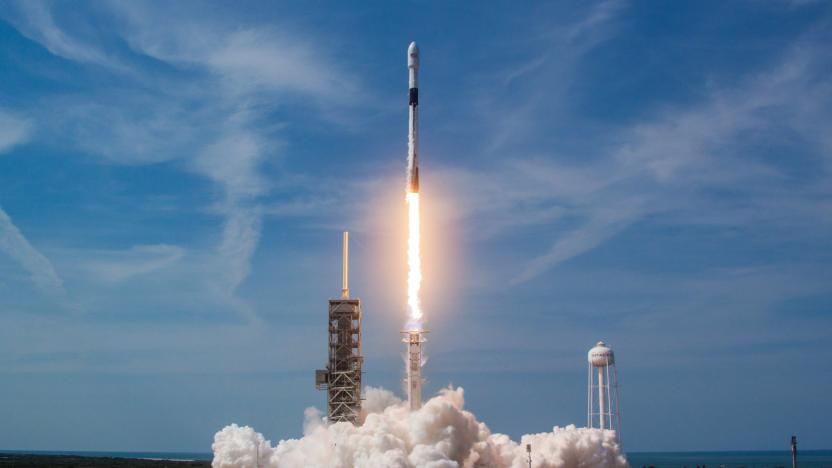
SpaceX’s Falcon 9 rocket heading for milestone third launch
SpaceX is gearing up to launch the final Falcon 9 rocket design for the third time, just months after reusing it to blast off a satellite to geostationary orbit. The move would be a milestone of sorts for the private space company, marking the first time a single first stage booster has been used more than twice for missions. On its third go, the Falcon 9 will reportedly be used on a SSO-A launch to carry a rideshare mission of dozens of small satellites for Spaceflight on November 19, reports Ars Technica.
Saqib Shah10.25.2018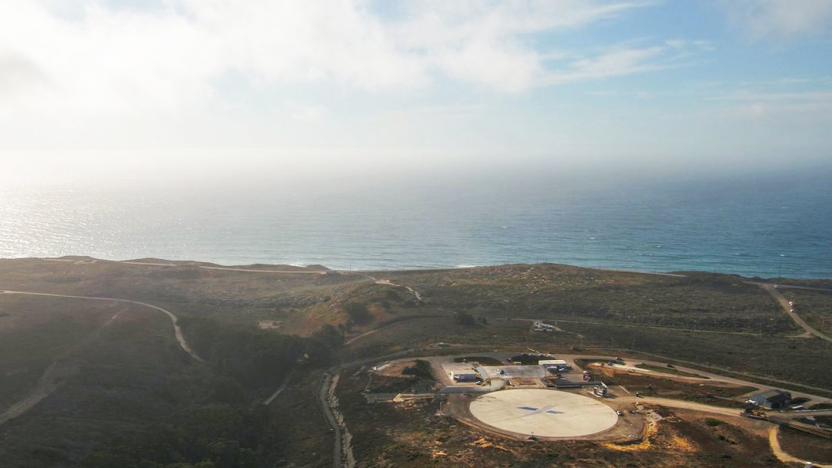
Watch SpaceX's first West Coast ground landing at 10:21PM ET (update: success)
SpaceX may be an old hand at rocket landings by this point, but there are still a few firsts left. The private spaceflight company is launching Argentina's SAOCOM 1A satellite from Vandenberg Air Force Base at 10:21PM Eastern (7:21PM Pacific), and you'll want to watch what happens on the way down. If all goes according to plan, this will be SpaceX's first ground landing on the West Coast -- it used a drone ship for California missions until now. You can start watching live on YouTube (below) 15 minutes before takeoff.
Jon Fingas10.07.2018
SpaceX reveals identity of the world's first lunar space tourist
The last time that humanity set foot on the lunar surface, Richard Nixon was still president and Pink Floyd was still in the midst of recording their seminal album about its dark side. And while SpaceX's tourism plans don't involve actually setting down on our nearest celestial neighbor, the company does hope to put Yusaku Maezawa, the billionaire founder of Japanese fashion retailer, Zozotown, as close to it as any human has been in the past couple of decades.
Andrew Tarantola09.17.2018
NASA supports SpaceX plan to fuel rockets with astronauts on board
As SpaceX gears up to launch NASA astronauts to space with its Falcon 9 rockets, the agency has been debating whether to allow the company to fuel its spacecraft after astronauts have boarded. SpaceX typically fuels its rockets shortly before launch in order to prevent its cooled propellant from warming up too much, but as it moves toward crewed flights, that practice raised safety concerns. However, NASA has now decided that it will move forward with the SpaceX plan to fuel rockets after astronauts have already boarded.
Mallory Locklear08.20.2018
Next-gen GPS satellite launch delayed again
Vice President Mike Pence laid out plans for the US Space Force on Thursday, calling out an advanced type of satellite, GPS III, that is apparently resistant to tampering. According to Bloomberg, however, this specific orbital machinery has been delayed for the last four years, and the launch date has slipped yet again.
Rob LeFebvre08.10.2018
SpaceX relaunches the final Falcon 9 rocket design
Tonight, SpaceX has launched a satellite to geostationary orbit, but that payload isn't what makes this mission special: it's the rocket itself. The private space corporation has reused a Block 5 booster for the first time, the same one it used to launch a Bangladesh communications satellite back in May. Block 5 is the final version of the company's Falcon 9 rocket, which SpaceX expects to reuse for up to 100 times.
Mariella Moon08.07.2018
Today’s SpaceX launch will help NASA monitor climate change
Today, SpaceX is scheduled to launch a previously flown Falcon 9 rocket from Vandenberg Air Force Base in California. Liftoff is currently scheduled for 3:47 PM ET (12:47 PM PT). The payload includes five Iridum NEXT communication satellites and a pair of Earth-observing satellites called GRACE-FO; you can watch liftoff below.
Swapna Krishna05.22.2018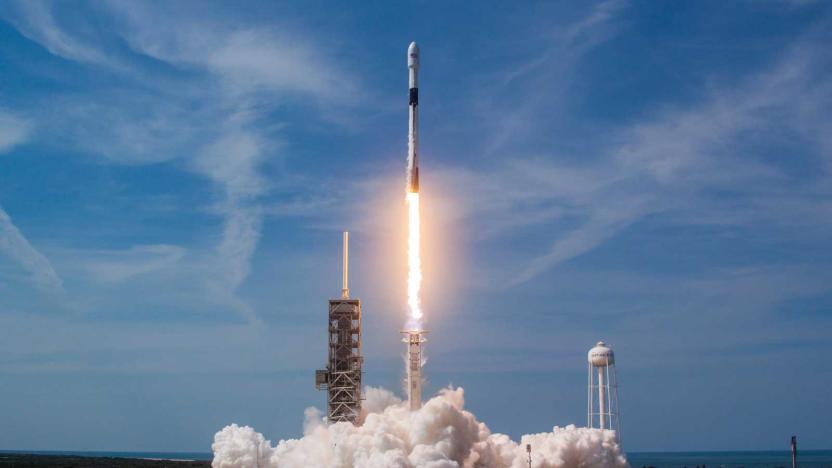
SpaceX's Falcon 9 rocket has roughly 300 launches before retirement
Now that SpaceX's final Falcon 9 design has launched for the first time, there's a looming question: how many more launches does the vehicle have left? Elon Musk has an idea. He estimated that SpaceX will build 30 to 40 more Falcon 9 cores for "~300 missions" over the next five years. The pioneering rocket isn't going to go quietly, in other words -- and each core is expected to get several uses before it retires.
Jon Fingas05.13.2018
The final design of SpaceX’s Falcon 9 rocket launches today (updated)
SpaceX's launch that's scheduled for this afternoon may appear to be a routine launch to deploy a satellite, but it's actually anything but. Bangabandhu Satellite-1, scheduled for a launch window that opens at 4:12 PM ET, marks the first launch of the Falcon 9 Block 5 rocket. The Block 5 is the last upgrade of the Falcon 9; there will be no more major updates to the rocket, so this is the version of the rocket that will eventually be human certified. Update: The launch has been rescheduled after an auto about at T-1 minute, and SpaceX says crews are preparing for its next launch opportunity tomorrow, on May 11th at 4:14 PM ET. Update 2 (5/11): The rocket successfully launched, and the Falcon 9 Block 5 first stage has returned for a safe landing on a droneship. You can watch the archived video stream below.
Swapna Krishna05.10.2018
SpaceX preps for manned spaceflight with Falcon 9 satellite launch
SpaceX has decided that the latest version of its Falcon 9 rocket is ready to take off after a static-fire test conducted on May 4th. The private corporation has revealed on Twitter that it's planning to launch Bangladesh's Bangabandhu-1 communications satellite to orbit on May 10th on top of a Falcon 9 Block 5 rocket. Block 5 was designed to have greater and better landing legs, because it's the spacecraft the company will use to send astronauts to the ISS. In addition to having more power, one of its other main features is reusability: a Block 5's first stage was developed to fly 10 times or more.
Mariella Moon05.08.2018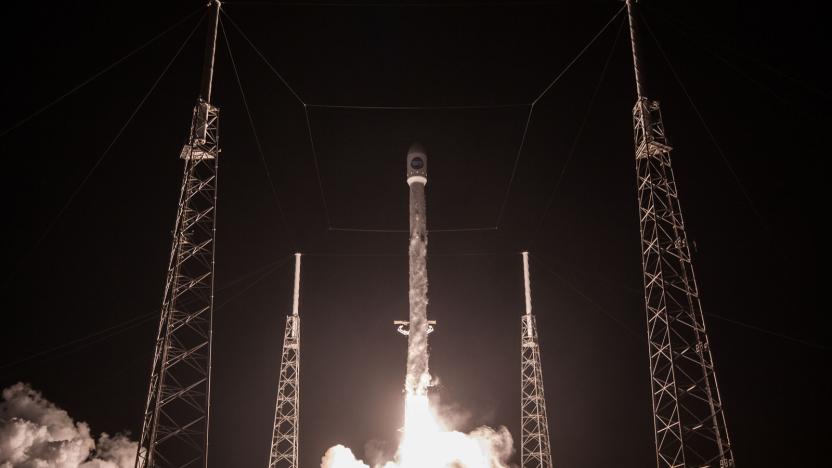
SpaceX will try 'giant party balloon' to slow upper rocket stages
SpaceX ultimately wants to recover every stage of a rocket, not just the first, and it may resort to some unusual tactics to get more control over those stages. Elon Musk has claimed that his company will try to take rocket upper stages out of orbital velocity using a "giant party balloon" -- yes, he knows it sounds "crazy." He hasn't shed more light on the subject as we write this, but we've reached out to SpaceX to see if it can elaborate.
Jon Fingas04.15.2018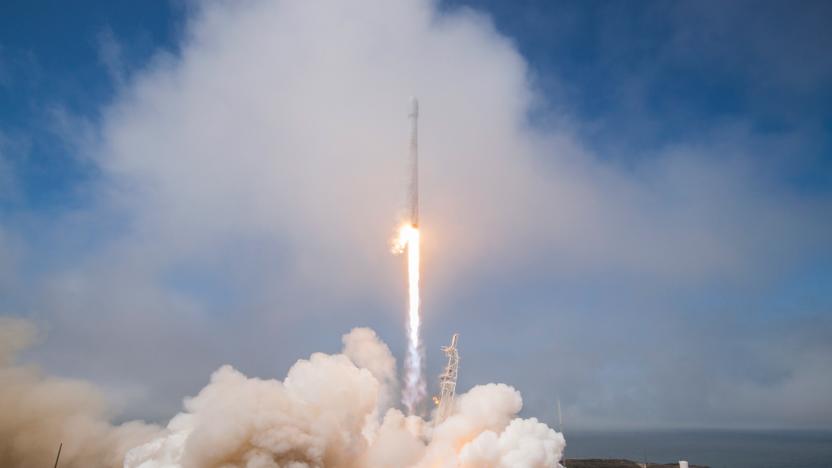
SpaceX rocket carved giant hole in the ionosphere
Rockets can leave a mark on the atmosphere well after they've left, and SpaceX may have learned that first-hand. Researchers have determined that a Falcon 9 launch in August 2017 (the Formosat-5 mission above) not only created circular shockwaves, but cut a 559-mile hole in the plasma of the ionosphere that lasted for up to 3 hours -- it was akin to a localized magnetic storm. The phenomenon was produced by virtue of the rocket's light payload.
Jon Fingas03.25.2018
Watch SpaceX's Falcon 9 launch its internet satellite payload (updated)
A SpaceX Falcon 9 is blasting into the skies today carrying Hisdesat's PAZ satellite, which will spend five and a half years carrying out radar and imaging work for the Spanish government and businesses. The launch, which uses a first stage booster previously used last August during the FORMOSAT-5 mission, will also have on board SpaceX's first demonstration satellites for its proposed satellite broadband service, which will be tested out before a full constellation launch over the next five years. Weather permitting, you'll be able to watch the launch live on PAZ's YouTube channel at 9AM EST (6AM PST), although a back-up window has been scheduled for Thursday, February 22nd, should things go awry -- since today's launch was initially slated for February 17th, that's not entirely unfeasible. Update 2/21/18 9:27AM ET: SpaceX has announced that the launch will be delayed until February 22nd due to strong winds. Standing down today due to strong upper level winds. Now targeting launch of PAZ for February 22 at 6:17 a.m. PST from Vandenberg Air Force Base. — SpaceX (@SpaceX) February 21, 2018
Rachel England02.21.2018